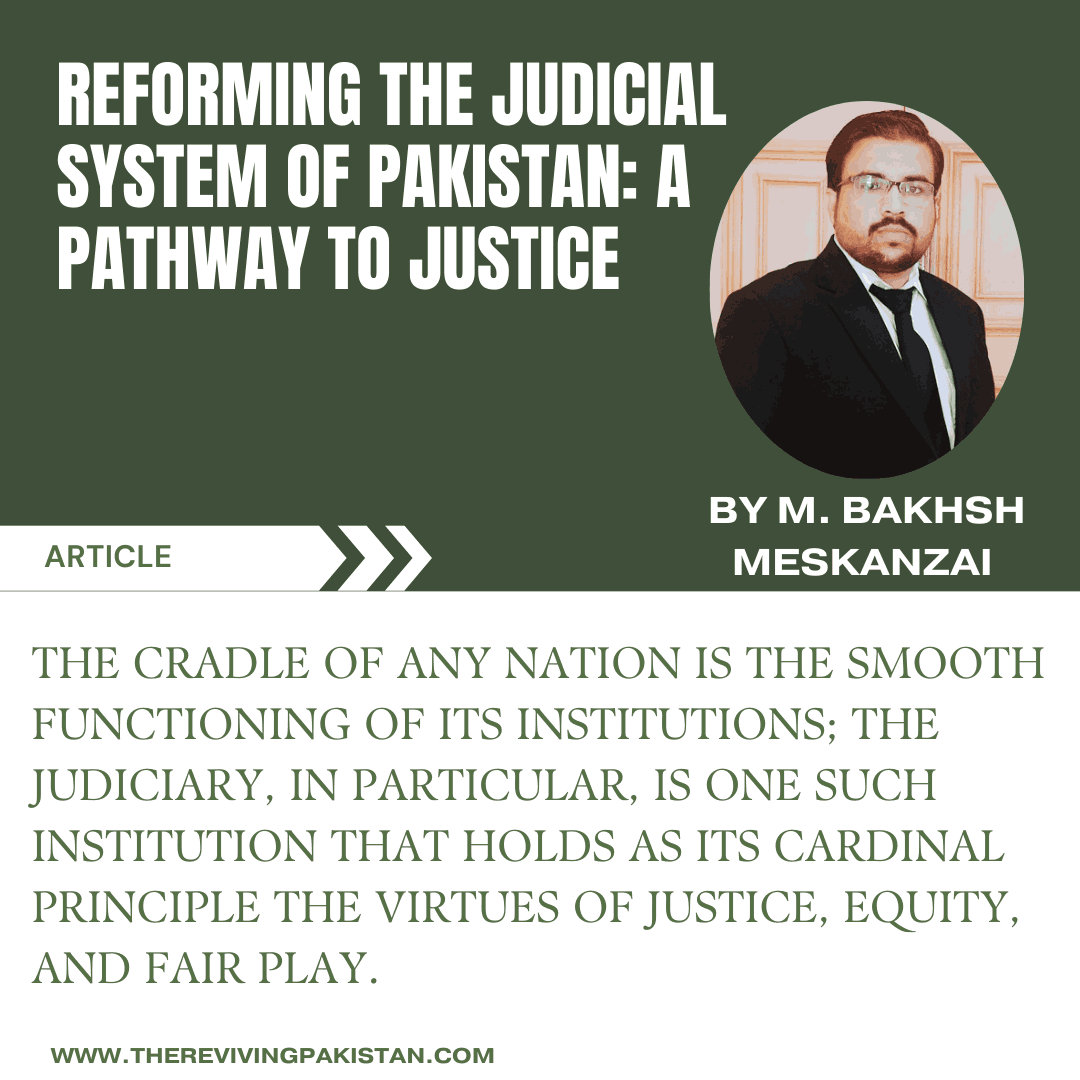About the Author(s)

Muhammad Bakhsh Meskanzai
Author is a distinguished creative writer and a competent practicing lawyer with a stellar track record in writing and advocacy. His expertise seamlessly blends legal acumen with a flair for socio-political commentary, making his work both impactful and thought-provoking.
The cradle of any nation is the smooth functioning of its institutions; the judiciary, in particular, is one such institution that holds as its cardinal principle the virtues of justice, equity, and fair play. The judicial system in Pakistan, on the other hand, is caught in the cobwebs of several complexities that belie the smooth functioning of this great institution. To revive and reinvigorate this crucial institution from its present piteous condition, a drastic and all-comprehensive overhaul, beginning from the grass-roots level is imperatively indispensable.
Reforms for this effect must guarantee and protect fundamental human rights, ensure the rule of law, and secure the supremacy of the Constitution with the introduction of robust amendments that balance the powers of the Legislature, Executive, and Judiciary. The judiciary, however, is an arm that cannot compromise its independence, the impartiality of its judgments, and the promotion of transparency and accountability within its ranks.
Parallel to these legal and structural reforms, judiciary modernization by the adoption of technology and digital case management systems is also an imperative need. Some initiatives, such as digital court libraries, e-court portals, and mobile-based service delivery systems, would take the judicial process closer to people. Videoconferencing in courts and jails, and live telecasting of court proceedings are some other aspects that would increase transparency and access to justice.
Intrinsic to the pursuit of judicial reform, with all its humanitarian tinge, is to uphold human rights—those that cannot be taken away and form the center of a just society. The rights, enshrined in the Universal Declaration of Human Rights 1948 and consolidated in constitutions the world over, would lie at the bedrock on which any judiciary ought to stand. These rights, from Articles 8 to 28, have been placed in the Constitution of Pakistan, and all organs of the state must protect and defend them. The main function of the judiciary is to award prompt remedies to the person or persons whose rights have been violated and to strike down any law that conflicts with those rights.
One of the salient features of a strong and stable judiciary is the rule of law. This very principle has been compromised time and again in Pakistan, leading to the detriment of public trust. According to the World Justice Project’s Rule of Law Index 2021, Pakistan stands at the 130th position among 139 countries—no doubt a humble reminder of what the courts are up against. However, this situation can be reversed with sincere and diligent efforts. Any stable and firmly-based reforms within the rule of law in Pakistan need to be supported by a sound judicial system, firmly rooted in their common commitment to justice and equity.
Equally important is the supremacy of the Constitution, which has to be safeguarded, and any lapses in the judiciary curtailed and the process made just. The Constitution is for controlling all state organs and citizens, whose ideals must be translated into practice by giving life to balance and introducing positive constitutional amendments. This will eventually bring about the much-required reforms in the judicial system of Pakistan.
The independence of the judiciary is the mainstay of any judicial reform initiative. In that context, independence of the judiciary, as embedded in Articles 175 to 212 of the Constitution of Pakistan, 1973, means judgments are free of bias and pressures. In the same vein, there will be an equal need for transparency and accountability within the judiciary if public confidence is to be retained. Judges have to be responsible for their actions, and appointments to that office need to be transparent so that the persons elected to serve on the bench are only those of the highest integrity.
The modernization of the judiciary system of Pakistan is also critical for its reform. The digital case management systems, e-court portals, and mobile-based services will considerably rationalize the judicial process and make it more accessible to the people at large. Other associated aspects of this reform, like video conferencing in courts and jails and the live telecast of court proceedings, are most likely to enhance transparency and efficiency in the courts.
An e-prison management system would be introduced into the criminal justice system, whereby prisoners could now appear in courts virtually, thereby reducing the burden on the physical court system. Similarly, the process for lodging FIRs shall be modernized and frivolous/vexatious complaints discouraged, thereby ensuring that there is fairness and efficiency in the process of justice.
The huge backlog in courts—350,539 cases pending in superior courts as of January 2024—presents one of the main hurdles to the realization of justice in Pakistan. Another angle this backlog stems from is the shortage of judges, with 1,048 posts lying vacant in the district and high courts across the country. Addressing this issue will ensure the smooth running of courts so that justice is not delayed.
The role of advocates in delaying cases, particularly in civil matters, cannot be overlooked in judicial reform. Judges should implement strict rules regarding repeated adjournments since too-long cases undermine justice delivery.
Overall reform in the judiciary cannot be achieved without equal work in the development of legal education and training. Legal information and resources need to be available not only to law students but also to laypersons and marginalized groups. The access to legal aid, and by extension, the access to inexpensive and speedy justice for all, becomes very important in using the law as a tool for building a just and fair society. In a nutshell, Pakistan’s judicial system has the potential for serious reforms and remarkable improvement only when these strict measures and standards, after being introduced, get absorbed into the judiciary and are accepted by all stakeholders of the state. It is only through such collective commitment that a judiciary commanding respect for its quest for justice and inspiring confidence among the people at large can be achieved.

